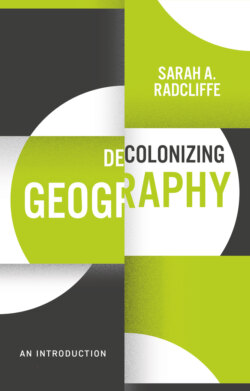Decolonizing Geography

Реклама. ООО «ЛитРес», ИНН: 7719571260.
Оглавление
Sarah A. Radcliffe. Decolonizing Geography
Table of Contents
List of Tables
List of Illustrations
Guide
Pages
Series Title. Decolonizing the Curriculum
Decolonizing Geography. An Introduction
Copyright Page
Dedication
Author’s Note
Preface
Foreword: Decolonizing in a North–South Dialogue Rogério Haesbaert
Figures, Tables and Boxes
1 Why Decolonize Geography? I The Geographies of Coloniality
Coloniality
Coloniality’s urban landscapes and decolonizing action
Imperialism
Decolonizing
II Coloniality (How to Recognize It) and Decolonizing
Box 1.1British opinion on colonial histories
Box 1.2Resisting European knowledge systems in Africa
III Historical Geographies of Colonialism and Decolonization
Colonialisms: plural forms, diverse outcomes
Decolonization: political independence?
Decolonizing: unfinished business
Box 1.3Decolonizing Europe
IV Coloniality and Modernity in the One-World World
Physical geography and colonial science
Geography’s ‘one-world world’
V Racism in the Colonial Present
Racialization
VI Decolonizing Geography: An Introduction
Decolonizing physical geography
Decolonizing in practice: re-drawing Los Angeles
Why decolonizing geography matters
VII Chapter Summary and Outline of Book
Outline of the book
Further Reading and Resources. Readings
Websites
Notes
2 Postcolonialism and Decoloniality
I Postcolonialism: Critiques of Colonial Discourse
Limitations of postcolonialism
II Subaltern Studies
Box 2.1Overlapping borders and identities
Limitations of the subaltern studies approach
III Modernity-Coloniality-Decoloniality (MCD) Group
Box 2.2Coloniality and the who/where of knowledge
Limitations of the MCD approach
Box 2.3Connecting physical geography and postcolonial-decolonial approaches: weather, climate and Aboriginal knowledges
IV Indigenous and Settler Colonialism Theories
Limitations of Indigenous and settler colonialism theories
V Chapter Summary
Further Reading and Resources. Readings
Websites
Notes
3 Decolonizing Geographies
I Geography’s Sanctioned Ignorance
Box 3.1Anti-racism and school geographies in the UK
Epistemology
II ‘Alterable Geographies’: Ways to Decolonize Geography
III Turning the Decolonial into Geography
What geography adds to decolonizing
IV Decolonial Kaleidoscope
Indigenous geographies
Black geographies
Box 3.2Plantation futures: Katherine McKittrick
Decolonial feminisms and decolonizing embodiments
Critical geographies of violence and peace
V Ways Forward: Limitations of Decolonizing Approaches
VI Chapter Summary
Further Reading and Resources. Readings
Websites
Notes
4 Decolonizing Geographical Concepts
I Space, Place and Scale
Ontology
Box 4.1Indigenous place-making under settler colonialism: Oklahoma
II Society and Space
Box 4.2Murdered and missing Indigenous, Black and racialized women and girls in the Americas
Box 4.3Body-territory/Cuerpo-territorio
III Environment and Landscape
IV Nature and the More-Than-Human
Box 4.4Rights of nature: rethinking nature as a legal being
Box 4.5Pluriverse: ‘a world in which many worlds fit’
V Chapter Summary
Further Reading and Resources
Readings
Dictionaries of human geography
Websites
Notes
5 Decolonizing Geography’s Curriculum
I Coloniality and Education
II Decolonizing the Teaching-Learning Process
Box 5.1The challenges of decolonizing a university
III Decolonizing the Curriculum
Decolonizing the canon
Reading and more
IV Tackling Classroom Racism
Box 5.2Critical race topics and geography
V Decolonizing Pedagogies
Box 5.3Global lives in public spaces: cultural and historical geography
Box 5.4Learning from the land
VI Opening the Classroom to the World
VII Decolonial Understanding and Multi-Epistemic Literacy
VIII Chapter Summary
Further Reading and Resources. Readings
Websites
Podcast
Notes
6 Decolonizing Geographical Research Practice
I Decolonizing Research: Principles and Goals
Box 6.1Short student projects: learning to decolonize
Experimentation
Humanizing research and building accountability
Principles of decolonizing research: in summary
II Decolonizing Research Design
Decolonizing research rationales from the start
Box 6.2The novice researcher and decolonizing processes
Box 6.3Decolonizing physical geography: water catchment research
Participatory research and decolonizing agendas
Refusal
Becoming a decolonizing scholar ally
III Designing Methodologies
IV Ethical Issues and Dilemmas
Box 6.4Sample consent form and agreement
V Analysis, Writing and Sharing
Box 6.5Aymara Indigenous control over writing and sharing
VI Chapter Summary
Further Reading and Resources. Readings
Websites
Decolonizing research under Covid-19
Notes
Glossary
Bibliography
Index
POLITY END USER LICENSE AGREEMENT
Отрывок из книги
Sarah A. Radcliffe
My position in these geopolitical and intersectional configurations is as a white, cis-gender woman with an Anglo name in an overwhelmingly white British department of geography. My training and experience are in human geography; the department includes human and physical geographers, the vast majority white, especially among faculty. Geographers of colour have argued rightly that geography’s urgent task of decolonizing must not rest solely on racialized minorities. I concur wholeheartedly, and as a white ally stress the importance of white geographers’ informing themselves about decolonizing and anti-racism. The construction of a decolonial pluri-geo-graphy – or a world of many worlds – depends on all of us. Plural decolonizing geographies crucially require white geographers to take responsibility for and actively work to overturn racialized exclusions and assumptions. The knowledge geopolitics behind this book additionally reflect my decades of ethnographic work with Latin American scholars, activists and communities, especially in Andean rural districts and with Indigenous groups, leaders and organizations. It is their critiques, experiences of racism and exclusion, and hopeful agendas for change that enliven this book. In terms of its focus, however, the book is written to be accessible and relevant for physical as much as human geographers. The chapters include physical and human geography examples, discussions, and pointers to further reading. The book was also influenced by events during the Covid-19 pandemic which provided daily reminders of coloniality’s persistence and of decolonizing ripostes such as the Black Lives Matter movement.
.....
Box 2.2 Coloniality and the who/where of knowledge
Box 2.3 Connecting physical geography and postcolonial-decolonial approaches
.....